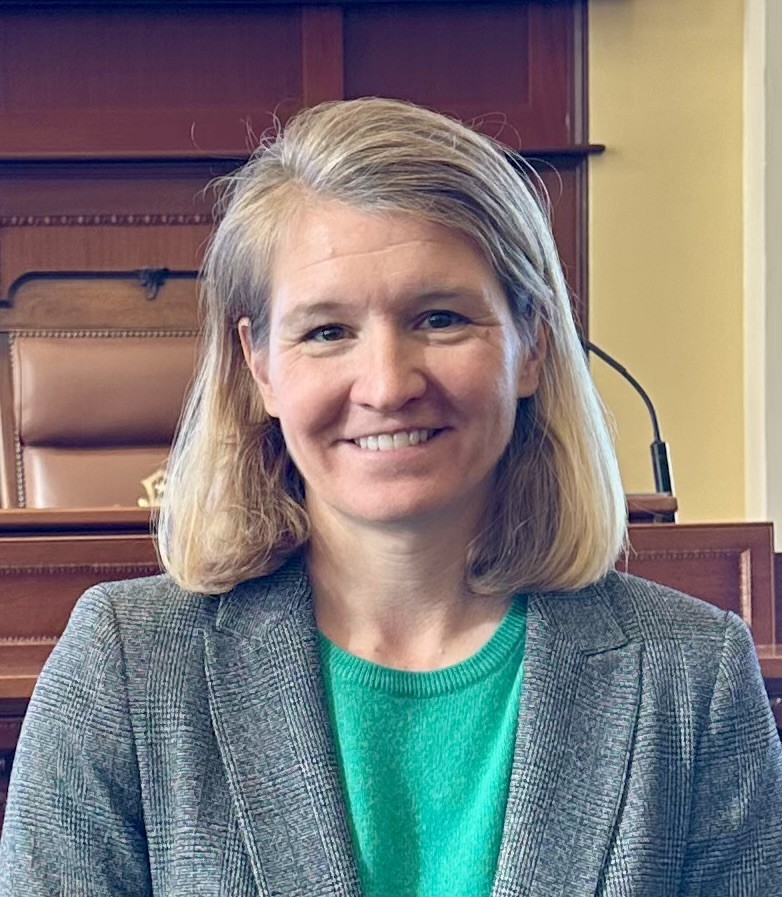Holt defends N.B.'s 'cooler heads' approach on electricity sales to U.S.
Premier says she won’t cut off power to Maine or apply surcharge ‘just for show’
Premier Susan Holt is defending her decision to not use electricity exports to Maine as leverage against U.S. tariffs, arguing the move might cause long-term pain for New Brunswickers.
In a week that saw Ontario Premier Doug Ford secure a meeting with Trump administration officials in Washington after his electricity threat, Holt said she would not give in to the temptation to "lash out" at the United States.
She said adding a surcharge to N.B. Power's electricity exports, or cutting them off altogether, might lead U.S. utilities to do the same to New Brunswick when it needs to import electricity.
"If I'm going to ask New Brunswickers to go through pain that I'm going to put on them, it better be because that's going to yield a result of reducing or eliminating the tariffs that the Americans have put in place, and not just for show," she said.
"I'm not certain that adding a surcharge to what the folks in Maine experience is going to yield a result from the White House, and instead will just cause damage to a relationship that we want to protect in the long run."
Ford's announcement Monday of a 25-per-cent surcharge on Ontario's electricity exports to three U.S. states provoked an angry reaction from President Donald Trump.
 Ontario
Premier Doug Ford made a bold threat to add a 25 per cent surcharge on
exports of U.S.-bound electricity this week but later suspended the levy
once a meeting with a Trump official was set. (Chris Young/The Canadian Press)
Ontario
Premier Doug Ford made a bold threat to add a 25 per cent surcharge on
exports of U.S.-bound electricity this week but later suspended the levy
once a meeting with a Trump official was set. (Chris Young/The Canadian Press)
Trump said he would double some planned tariffs on Canadian exports, then backed down after Ford agreed to suspend the surcharge and travel to Washington to meet with Commerce Secretary Howard Lutnick.
"The president woke up this morning and he saw it and he jumped right on it," Lutnick told CBS News earlier this week.
But Holt said she would prefer to let "cooler heads prevail" rather than poke the U.S. president into a reaction.
About 58,000 Maine residents are customers of four local utilities that rely exclusively on N.B. Power for electricity.
They are not connected to the larger regional power grid in the southern part of the state, leaving them nowhere else to go to turn on their lights and heat their homes.
Holt said leveraging that fact might prompt U.S. policymakers to extend that grid to northern areas of the state, which would mean a loss of customers — and revenue — for N.B. Power.
 Ford has agreed to meet with U.S. Commerce Secretary Howard Lutnick to discuss tariffs. (Ben Curtis/The Associated Press)
Ford has agreed to meet with U.S. Commerce Secretary Howard Lutnick to discuss tariffs. (Ben Curtis/The Associated Press)
"These are decisions that need to be taken very carefully. They can't be made as a knee-jerk situation, because our situation here in New Brunswick is unique."
The utility's already precarious financial position makes it even harder to contemplate that risk, the premier acknowledged.
She said her government is looking at "many different options" to help the utility deal with a $5 billion debt that has forced it to hit customers with large rate increase last year and this year.
"The status quo is no longer an option with N.B. Power," she said.
That could include a rate freeze, rebates, easing the Crown corporation's debt-reduction targets, moving some of its debt onto the government's accounts or even selling the utility.
"That's on the table," she said of a possible sale.
A previous Liberal government's attempt to sell the utility to Hydro-Quebec in 2009 prompted a widespread popular backlash in the province and contributed to the party's defeat in an election the following year.
 Holt
says she is deciding whether to keep the Tesla electric cars in her
government's fleet. Tesla, owned by Trump ally Elon Musk, is among
companies 'seeking to do New Brunswickers harm,' she said. Musk, left,
and Trump promoted Tesla products earlier this week at the White House.
(Pool/The Associated Press)
Holt
says she is deciding whether to keep the Tesla electric cars in her
government's fleet. Tesla, owned by Trump ally Elon Musk, is among
companies 'seeking to do New Brunswickers harm,' she said. Musk, left,
and Trump promoted Tesla products earlier this week at the White House.
(Pool/The Associated Press)
Holt did not announce any new provincial countermeasures to the U.S. tariffs Thursday, acknowledging that her government does not have "a dozen tools at our disposal."
She said American alcohol remains off the shelves in N.B. Liquor stores and the government has "looked at" replacing service contracts it has with U.S. companies, once it sorts out the cost implications and the availability of alternative suppliers.
A spokesperson said later in the day, however, that no contracts have been cancelled to date.
Holt also said officials would "look at" whether to keep the Tesla electric cars in the government fleet — referring to the company, owned by Trump ally Elon Musk, as among "companies seeking to do New Brunswickers harm."
Holt said she would use the weekly news conferences "to talk about the things you want to talk about, and to provide a forum for regular communication during a time of consistent uncertainty. … It's my job to connect with New Brunswickers in a time of uncertainty."
She also referred to how stressful the trade war is and, after providing a toll-free phone number for mental health support, urged New Brunswickers "to be with your friends, to get outdoors, to clear your head, to turn off the news and to reach out to the people around you."
Holt hesitates to use N.B.'s most powerful trade lever: electricity
58,000 Maine residents rely on New Brunswick for power, but so far, premier is reluctant to cut them off
New Brunswick's most powerful lever in Canada's trade war with the United States is found mostly along the province's back roads, cutting through forests and across fields rarely seen by most residents.
That lever — a series of N.B. Power transmission lines running to the border with Maine — is one that, so far, Premier Susan Holt is opting not to use to strike back.
"Our government is using every tool in our toolbox to protect New Brunswick workers and our economy," Holt said last week when she rolled out her action plan in response to President Donald Trump's 25 per cent tariffs on most imports from Canada.
But not every tool. Not exactly.
Holt promised to spend tens of millions of taxpayer dollars helping hard-hit companies and workers absorb the impact of the tariffs.
She avoided a riskier, more painful — but possibly more effective — option.
In northern and eastern Maine, 58,000 people rely on electricity from N.B. Power to keep their lights on and their homes warm.
They're not connected to the large-scale regional power grid in the southern part of the state.
They have nowhere else to go for power.
"Electrically, northern and eastern Maine are part of Canada, not part of the rest of the United States," says Bill Harwood, a former public advocate who represented state residents at energy regulatory hearings.
"They are integrated into the New Brunswick system and the electricity comes from New Brunswick."
Four local utilities are now working through what Trump's tariffs on Canadian imports will cost them — and how to pass those costs onto their customers.
 Bill
Harwood, a former public advocate who represented Maine residents at
energy regulatory hearings, says those who rely on N.B. Power have some
of the lowest incomes in the state. (CBC/Zoom)
Bill
Harwood, a former public advocate who represented Maine residents at
energy regulatory hearings, says those who rely on N.B. Power have some
of the lowest incomes in the state. (CBC/Zoom)
If Holt slapped an additional surcharge on that electricity, it would increase the pain even more.
"A lot of this is unknown," said Greg Sherman, the general manager of Houlton Water Company, which serves 5,500 customers in and around Houlton.
Another electricity company, Versant Power, has more than 37,000 customers in northern Aroostook communities such as Caribou, Presque Isle, Fort Kent and Van Buren.
"We are staying tuned for more details on potential federal policy changes," spokesperson Tina Morrill said.
 Harwood
says cutting off power to northern Maine would spark 'an international
crisis' that would require political regulatory intervention. (Michael Heenan/CBC)
Harwood
says cutting off power to northern Maine would spark 'an international
crisis' that would require political regulatory intervention. (Michael Heenan/CBC)
In Ontario, Premier Doug Ford has threatened to cut off electricity transmission to neighbouring states "with a smile on my face, and I'm encouraging every other province to do the same."
That attracted widespread U.S. media attention, and Ford repeated the threat again Monday as he slapped a 25 per cent export surcharge on electricity sales to New York, Michigan and Minnesota — the equivalent of about $100 extra per month per household, he said.
At her announcement last week, Holt said she wanted to avoid hurting Americans across the border.
"Our neighbours in Maine are our friends, and we want to put serious consideration into the decisions that might hurt some of the people that have already spoken up against the tariffs," she said.
Split views on tariffs
Trump won the areas of Maine that rely most on New Brunswick for power, so a surcharge or cutoff would squeeze supporters of the president who may support his move.
Even the district's Democratic congressman, Jared Golden, supports tariffs and did not sign a letter from other Maine politicians calling on Trump to cool it.
Harwood said Maine residents who rely on N.B. Power have some of the lowest incomes in the state.
"This would be a crushing financial burden on many of those customers," he said.
 Ontario
Premier Doug Ford has threatened to cut off electricity transmission to
neighbouring states 'with a smile on my face, and I’m encouraging every
other province to do the same.' (Justin Tang/The Canadian Press)
Ontario
Premier Doug Ford has threatened to cut off electricity transmission to
neighbouring states 'with a smile on my face, and I’m encouraging every
other province to do the same.' (Justin Tang/The Canadian Press)
Farther south, ISO New England, the agency operating the larger regional power grid across several states, has filed a regulatory application suggesting electricity may not be subject to the tariffs.
In the meantime, it's asking for clarity on what kind of mechanism it should use to collect the money.
"In a worst-case scenario, the ISO could be forced to file for bankruptcy protection should it have insufficient funds to cover costs stemming from such import duties," the filing says.
It also warns that N.B. Power and others in the New England market "may question or challenge continued participation" in that market if there is uncertainty about who will pay.
A day after saying she didn't want to inflict pain on Mainers, Holt offered a second explanation for hesitating: she prefers measures "that will hurt the U.S. and not hurt New Brunswickers," or their debt-laden Crown corporation, N.B. Power.
"It's possible that shutting off power to New England puts a big burden on a utility that is already challenged, and New Brunswickers already have power bills that are too high," she said.
Changing expectations
N.B. Power won't discuss what such a move would cost, saying only it's working with other power utilities "to address the challenge of potential tariffs head-on and ensure energy security for customers."
Holt's changing explanations and her reluctance to follow Ford's lead "indicates to me that they haven't thought it out well enough yet," Opposition PC Leader Glen Savoie said.
"The response was tepid and the government seems a bit overwhelmed."
 Donald Trump won the areas of Maine that rely most on New Brunswick for power. (Sam Farley/CBC)
Donald Trump won the areas of Maine that rely most on New Brunswick for power. (Sam Farley/CBC)
Harwood said cutting off power to northern Maine would spark "an international crisis" that would require political regulatory intervention.
The point of tariffs is to force people to purchase products from domestic suppliers.
But there is no such domestic producer of electricity in northern Maine, he said.
"If these people are relying on electric space heaters or heat pumps to get them through the remaining cold days of the winter and you cut off their electricity, you are creating a public health risk that is unacceptable." he said.
That comment underscores just how powerful a lever New Brunswick has.
A more aggressive move on electricity "may be on the table," Holt said March 4.
Then she corrected herself: "They are on the table. They may be implemented in the future."
Staff
Department Organizational Chart (PDF)
 Heather Sanborn, Public Advocate
Heather Sanborn, Public Advocate
Heather Sanborn has served as Maine Public Advocate since she was appointed by Governor Mills in January 2025.
From 2016 to 2022, Sanborn represented parts of Falmouth, Portland, and Westbrook as a member of the Maine House of Representatives and the Maine State Senate. During her service, Sanborn successfully championed legislation to reduce energy costs for Maine people and small businesses and to help the state reach its energy efficiency goals.
Sanborn spent the last 14 years as Director of Business Operations at Rising Tide Brewing, a craft brewery she co-founded with her husband Nathan.
Earlier in her career, Sanborn practiced law at Brann & Isaacson in Lewiston and Ropes & Gray in Boston, served as a Law Clerk to U.S. First Circuit Court Appeals Judge Kermit V. Lipez, and taught at Cape Elizabeth High School.
Sanborn holds a law degree from the University of Maine School of Law and a Master of Science in Educational Leadership from the University of Southern Maine. She graduated summa cum laude from Middlebury College, where she was salutatorian.
Heather may be reached via Heather.B.Sanborn@maine.gov.
Andrew Landry, Deputy Public Advocate
Andrew Landry joined the Public Advocate in July 2019. Before joining the office he was most recently a Partner at Preti Flaherty Beliveau & Pachios, LLP. He received his law degree from the University of Maine School of Law and his undergraduate degree from Syracuse University. Drew may be reached at Andrew.Landry@maine.gov
Susan Chamberlin, Senior Counsel, Climate Policy Advisor
 Susan
Chamberlin joined Maine’s Office of the Public Advocate as a senior
counsel in December, 2019. Susan previously served as Consumer Advocate
for the state of New Hampshire, appointed by Governor John Lynch. She
has both government and private practice experience in the utility and
energy fields. Susan is a graduate of Boston University School of Law
and received her undergraduate degree from Connecticut College. Susan
can be reached at Susan.W.Chamberlin@maine.gov
Susan
Chamberlin joined Maine’s Office of the Public Advocate as a senior
counsel in December, 2019. Susan previously served as Consumer Advocate
for the state of New Hampshire, appointed by Governor John Lynch. She
has both government and private practice experience in the utility and
energy fields. Susan is a graduate of Boston University School of Law
and received her undergraduate degree from Connecticut College. Susan
can be reached at Susan.W.Chamberlin@maine.gov
Kristina Winther, Senior Counsel

Kris joined the Office of the Public Advocate in 2021, coming from private practice for a small law office in Portland, Maine and before that as a solo practitioner. She received her law degree from Maine School of Law and her undergraduate degree from the Massachusetts Institute of Technology. Kris can be reached at Kristina.R.Winther@maine.gov
Richard P. Hevey, Senior Counsel
 Richard
Hevey joined the public advocate in November 2022. Before joining the
office,he was most recently employed as senior counsel for Central Maine
Power Company and secretary and clerk for Maine Natural Gas
Corporation. He received his law degree from the University of Maine
School of Law and his undergraduate degree from the University of Maine
at Orono. Rich may be reached at richard.p.hevey@maine.gov
Richard
Hevey joined the public advocate in November 2022. Before joining the
office,he was most recently employed as senior counsel for Central Maine
Power Company and secretary and clerk for Maine Natural Gas
Corporation. He received his law degree from the University of Maine
School of Law and his undergraduate degree from the University of Maine
at Orono. Rich may be reached at richard.p.hevey@maine.gov
Brian T. Marshall, Senior Counsel
 Brian
joined the Office of the Public Advocate in November, 2022. Prior to
joining the OPA, Brian worked as regulatory counsel for Versant Power.
Brian graduated from Vermont Law School in 2013 and has been working in
energy and utilities in Maine since 2015. He can be reached at brian.t.marshall@maine.gov.
Brian
joined the Office of the Public Advocate in November, 2022. Prior to
joining the OPA, Brian worked as regulatory counsel for Versant Power.
Brian graduated from Vermont Law School in 2013 and has been working in
energy and utilities in Maine since 2015. He can be reached at brian.t.marshall@maine.gov.
Sylvia Most, Senior Assistant to Public Advocate

Sylvia joined the Office of the Public Advocate in 2024 after 12 years in classroom teaching, with experience in business ownership, management consulting, and process engineering. Sylvia has an MBA from Northeastern University, a Master’s Degree in Teaching and Learning from the University of Southern Maine, and received her Bachelor of Science in Mechanical Engineering from the University of Vermont. She has also studied Public Policy at the Muskie School. Sylvia can be reached at Sylvia.J.Most@maine.gov.
Shareen Thompson, Special Assistant to Public Advocate

Shareen joined the Office of the Public Advocate in March 2018. Prior to joining the office, Shareen worked for the Maine Department of Labor, Office of the Commissioner, and brings with her countless years of diverse experience as a top-level administrative assistant. She received her associate degree in Executive Secretarial Science from Andover College. Shareen can be reached at Shareen.G.Thompson@maine.gov
Economic Analyst, Jesse Houck
 Jesse
joined the office in January 2023. Prior to joining the office, he
worked as the Finance Manager for Child Development Services, and before
entering public finance, worked as the Assistant Controller at Sunday
River Resort. Jesse received his MBA from Clarkson University. Jesse can
be reached at jesse.houck@maine.gov.
Jesse
joined the office in January 2023. Prior to joining the office, he
worked as the Finance Manager for Child Development Services, and before
entering public finance, worked as the Assistant Controller at Sunday
River Resort. Jesse received his MBA from Clarkson University. Jesse can
be reached at jesse.houck@maine.gov.
Elizabeth M. Deprey, Consumer Advisor
 Elizabeth
joined the Office of the Public Advocate in December 2022. Prior to
joining the office, she worked as tobacco prevention coordinator for
Kennebec County, and before entering the public health field, spent her
career in news writing in northern and southern Maine and in corporate
communications. Elizabeth graduated from the University of Maine with a
bachelor’s in journalism. She can be reached at elizabeth.m.deprey@maine.gov.
Elizabeth
joined the Office of the Public Advocate in December 2022. Prior to
joining the office, she worked as tobacco prevention coordinator for
Kennebec County, and before entering the public health field, spent her
career in news writing in northern and southern Maine and in corporate
communications. Elizabeth graduated from the University of Maine with a
bachelor’s in journalism. She can be reached at elizabeth.m.deprey@maine.gov.
Amy F. Osborne, Legal Assistant
 Amy
joined the Office of the Public Advocate in October 2023. Prior to
joining the office she worked in Mental Health and Human services. She
has worked with Maines most vulnerable populations whether when working
with children or working with those with persistent mental illness. Amy
is a life long student at the University of Maine at Augusta and has
prioritized the culture of Maine in her academic studies. Amy can be
reached at amy.f.osborne@maine.gov
Amy
joined the Office of the Public Advocate in October 2023. Prior to
joining the office she worked in Mental Health and Human services. She
has worked with Maines most vulnerable populations whether when working
with children or working with those with persistent mental illness. Amy
is a life long student at the University of Maine at Augusta and has
prioritized the culture of Maine in her academic studies. Amy can be
reached at amy.f.osborne@maine.gov
- 207-624-3687
- opa.admin@maine.gov
- Postal address: 112 SHS, Augusta, ME 04333-0112
- Physical Address: 103 Water Street, 3rd Floor, Hallowell, ME 04347
William S. Harwood
Bill Harwood has been actively involved in legal representation, policy initiative, and political change for over forty years. He works locally and nationally from his home state of Maine.
In 2000, after the Columbine High School shooting, he helped found Maine Citizens Against Handgun Violence (MCAHV) to lead efforts in Maine and served as its first President. Since then he has served on and chaired the Governing Boards of the Brady Campaign to Prevent Gun Violence and the American Bar Association Special Committee on Gun Violence. He has also served on the governing Board of States United to Prevent Gun Violence and the U.S. Department of Justice Safe Neighborhoods Project for Maine. He has authored articles on gun regulation and more recently, he has served as Board Chair of Maine Gun Safety Coalition (formerly Maine Citizens Against Handgun Violence) and taught a course on firearm regulation as an Adjunct Professor at the University of Maine School of Law.
As a partner at Verrill & Dana, Bill spent his career representing public utilities before state and federal regulatory agencies. Bill has represented electric, gas, water, and telecommunications companies in more than 50 major cases before the Maine Public Utilities Commission (PUC) and Federal Energy Regulatory Commission (FERC), including rate cases, prudence investigations, management audits, merger approvals, requests for Certificates of Public Convenience and Necessity, and rulemaking proceedings. Bill counseled utilities on proactive strategies to both anticipate regulatory developments and efficiently manage the regulatory process.
Bill was actively involved in the restructuring of the Maine electric utility industry, including the representation of utilities in the sale of their generating assets, recovery of stranded costs, and providing standard offer (default) service. Bill has represented developers of new transmission lines in securing Certificates of Public Convenience and Necessity and wind developers in negotiating Interconnection Agreements and securing adequate transmission capacity for delivery of the output.
In September 2021, Bill left private practice and joined Governor Mills Energy Office as a Senior Policy Advisor where he advised the Mills Administration on energy policy, including development of offshore wind and community solar farms, financial assistance to low-income energy consumers and energy legislation. In January 2022, Governor Mills nominated Bill to be Maine Public Advocate to represent ratepayers before the Legislature and state and federal regulatory agencies. After unanimous confirmation by the Maine Senate, Bill leads a dedicated team of professional at the Office of Public Advocate, protecting and advancing the interests of Maine ratepayers.
66 E. Elm Street
Yarmouth, Maine 04096
(207) 846-4843 (home)
(207) 233-1050 (cell)
William.Harwood@maine.gov
williamsnowharwood@gmail.com
EMPLOYMENT: State of Maine, Office of Public Advocate
Public Advocate
2022 -
State of Maine, Governor’s Energy Office
Senior Advisor for Regulatory Affairs
2021 - 2022
Verrill Dana, LLP, Portland, Maine
1979 - 2021
EDUCATION: Fordham University School of Law
Juris Doctor, cum laude, 1978
Harvard University
Bachelor of Arts, 1974
Governor Mills Statement on President's Decision to Delay Tariffs
March 6, 2025
Office of Governor
Governor Janet Mills today issued the following statement in response to the president's announcement that he will delay tariffs on Canada and Mexico until April:
"The president's broad tariffs on our major trading partners will increase prices for Maine people and businesses and cause havoc to our economy. While today's temporary tariff reprieves are welcome, they are creating significant economic uncertainty that is also damaging to our people, businesses, and our economy. I urge the president to stop his pursuit of these unnecessary tariffs and focus on fulfilling his campaign commitment to lower the prices of eggs, bread, heat, housing, and cars. "
Governor Mills has consistently expressed her concern that the president's pursuit of widespread tariffs -- particularly on Canada -- will drive up the cost of heating oil, gasoline, food, and other everyday essentials that Maine people and businesses rely on. Maine's economy is deeply intertwined with Canada's, and last year, the state traded more than $6 billion in goods with its northern neighbor. Maine is the most heating oil dependent state in the country -- and more than 80% of Maine's heating fuel and gasoline is imported from Canada.
The Governor dedicated her radio address last weekend to the economic threat posed by the tariffs, warning that "I can't be clear enough: the president's broad tariffs on Canada as well as China and Mexico will increase costs on Maine families and Maine businesses who can ill afford them, and they will cause great harm to our state's economy."
Governor Mills Warns that Maine People and Businesses Will Pay the Price for Tariffs
March 3, 2025
Office of Governor
In case you missed it, in her Radio Address this weekend, Governor Janet Mills warned that Maine people and businesses will pay more for heating oil, gasoline, food, and other everyday essentials if President Trump's plan to impose a 25% tariff on Canadian goods goes into effect tomorrow.
Governor Mills pointed out that Maine's economy is deeply intertwined with Canada, and that last year, the state traded more than $6 billion in goods with its northern neighbor. Maine is the most heating oil dependent state in the country -- and more than 80% of Maine's heating fuel and gasoline is imported from Canada.
"When Maine businesses have to pay higher tariffs to import materials they need, building supplies or other things, or pay to export their finished products, they will be forced to pass those costs along to Maine consumers at a time when we can least afford it. These tariffs clearly will result in higher prices on everything from fruits and vegetables, flat screen TVs, and auto parts and building supplies. This will cost more than $1,200 annually in purchase power for the typical United States household. I would estimate more for Maine households given our interrelationship with Canada," said Governor Mills.
"I can't be clear enough: the president's broad tariffs on Canada as well as China and Mexico will increase costs on Maine families and Maine businesses who can ill afford them, and they will cause great harm to our state's economy," continued Governor Mills.
Listen to the Governor's radio address.
Gov. Mills' office denies that Maine staffer swore at White House official

"The report is not accurate. Jeremy did not say those words. He did not engage in any profanity."
Governor Mills and President Trump got into a verbal sparring match Friday over the issue of transgender student athletes participating in girls’ sports. The exchange happened at the White House during a meeting for the National Governors Association.
- Also read: 'See you in court': Trump, Gov. Mills share heated exchange over trans students in sports
Trump announced Maine last week that will not receive federal education funding until the state complies with his executive order banning transgender students from playing in girls and women's sports.
Mills told Trump she will see him in court.
Jeremy.Kennedy@maine.gov
Staff
| Position | Name |
|---|---|
| Chief of Staff | Jeremy Kennedy |
| Deputy Chief of Staff | Scott Ogden |
| Deputy Chief of Staff | Tom Abello |
| Senior Policy Advisor/Legislative Affairs | Bethany Beausang |
| Senior Policy Advisor/Legislative Affairs | Joe Marro |
| Senior Policy Advisor/Legislative Affairs | Mary Anne Turowski |
| Legislative Coordinator/Office Manager | Greg Pierce |
| Chief Legal Counsel | Jerry Reid |
| Deputy Legal Counsel | Tim Feeley |
| Director of Communications | Anthony Ronzio |
| Press Secretary | Ben Goodman |
| Director of Speechwriting | Lindsay Crete |
| Director of Boards and Commissions | Joe Boucher |
| Director of Constituent Services | Sarah Ward |
| Deputy Director of Constituent Services | Evan Myers |
| Scheduler | Jordan Merrifield |
| Constituent Services Representative | Rose Keller |
| Director of Governor's Office of Policy Innovation and the Future | Hannah Pingree |
| Director of Governor's Energy Office | Dan Burgess |
| Director of the Blaine House | Chris Hart |
| Social Secretary | Alex AuCoin |
 Financial health of N.B. Power in the way of more extreme tariff counterpunch
Financial health of N.B. Power in the way of more extreme tariff counterpunch
 The tariff leverage New Brunswick’s premier is hesitating to use
The tariff leverage New Brunswick’s premier is hesitating to use
No comments:
Post a Comment